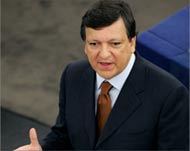EU to set up military units
Defence ministers in the European Union have agreed to create 13 so-called battle groups – military units that can be deployed rapidly to crisis situations around the world.

Dutch minister Henk Kamp said on Monday that the 1500-strong tactical groups, which will put flesh on long-standing EU plans to have an independent military capacity, would be ready for deployment within 15 days of any EU council request for their services.
One unit will be up and running by next year, he added.
France, Italy, Spain and Britain have each agreed to form one unit, and all other EU states have agreed to contribute to at least one other, said the Dutch minister, whose country currently holds the EU’s rotating presidency.
“The battle groups are at the forefront of capability improvement, providing the union with credible, rapidly deployable, coherent force packages capable of stand-alone operations, or for the initial phase of larger operations,” an EU statement said.
However, Eurosceptic groups see the move as a preliminary step towards a European army.
EU army
Geoffrey van Orden, a British member of the European Parliament, called the battle groups a diversionary sham.
He accused the British government of sacrificing the country’s forces to curry favour in Brussels and burnish Prime Minsiter Tony Blair’s European credentials.
“The battle groups are at the forefront of capability improvement, providing the union with credible, rapidly deployable, coherent force packages capable of stand-alone operations, or for the initial phase of larger operations” EU statement |
Britain and France launched the EU’s military project in 1998, each for different reasons.
By taking the lead, the British hope to keep European defence firmly rooted in the Atlantic alliance.
But the French elite talks of escaping Nato tutelage, and turning Europe into a military power that can stand up to the United States.
Meanwhile, 25 European commissioners are finally to take office on Monday after a long delay, eager to tackle tough issues such as EU economic reform along with the sensitive
brief of future Turkish EU membership.
Resignation demand
Commission president Jose Manuel Barroso has his work cut out in the next five years in reforming a slowing European Union economy.
He is keen on restarting an ambitious reform agenda which aims to make the now 25-nation bloc an economic powerhouse by the end of the decade.
 |
|
Barroso says he will concentrate |
But as the new commissioners take up their posts, they are already facing a potential crisis concerning the EU transport commissioner Jacques Barrot – whose resignation or at the very least suspension, the British leader of the European Liberal Democrats is demanding.
Graham Watson said on Sunday that Barrot had not informed the European Parliament, Barroso or his predecessor, Romano Prodi, over legal proceedings in the 1990s that targeted his Social Democratic Centre party, which Barrot headed at the time.
Barrot’s resignation was also demanded by Britain’s anti-EU UK
Independence Party (UKIP), which provoked a storm by airing the allegations in the European Parliament last week.
Watson said in a statement he hoped the commission’s reputation, which was shaken after a protracted row over Barroso’s first-choice team which forced the president to withdraw his entire line-up at the 11th hour, would not suffer further damage.
Economic growth
The EU parliament had objected to the arch-conservative views on gays and women of Barroso’s Italian choice for justice commissioner – a dispute with legislators which eventually made him go back to the drawing board.
On Friday, Barroso said he was confident of his new transport
commissioner, a day after a UKIP MEP vehemently attacked him during a debate in parliament.
According to Barroso’s office, the commission president has
since requested that Barrot send him all the relevant documents, and that he make himself available to the parliament for questions as well.
As he took office, Barroso highlighted economic growth across the European Union as essential in the years ahead.
He told French daily Les Echos that his priorities were
“everything that is linked to growth, everything to do with freedom and justice and which enables the strengthening of Europe’s role in the world”.